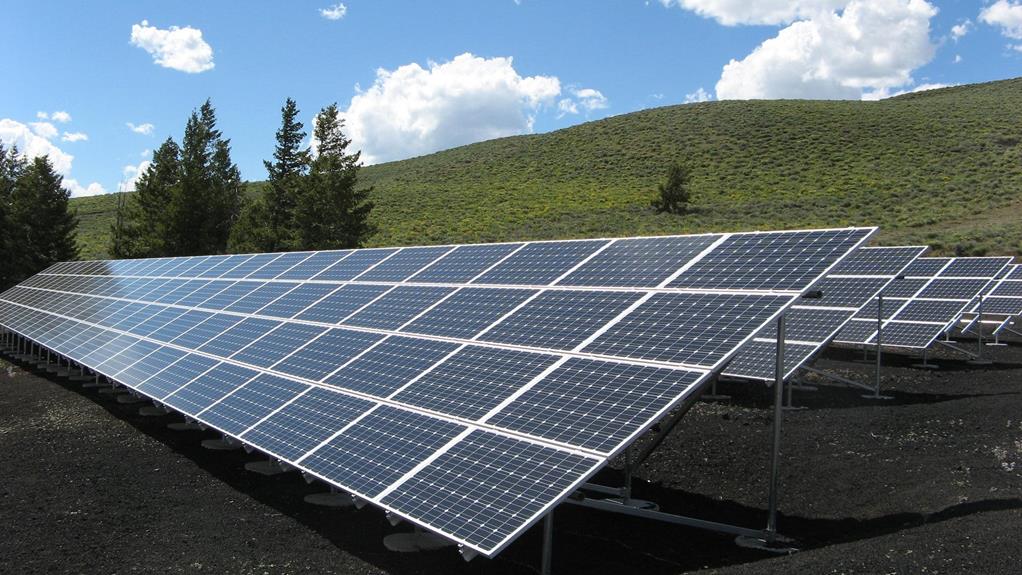Imagine a world where we harness the power of the sun, wind, and water to meet our energy needs. It may seem like a distant dream, but the truth is, it’s within our reach. In this article we’ll explore the 12 key advantages of renewable energy that will change the way you think about sustainable living.
By utilizing renewable energy sources, we can not only reduce greenhouse gas emissions but also lower energy costs, create jobs, and improve air quality. Join us and discover the positive impact they can have on our future.
Reduced Greenhouse Gas Emissions
How can utilizing renewable energy sources help us reduce greenhouse gas emissions?
By switching to renewable energy, we can significantly reduce our carbon footprint and contribute to environmental sustainability. Renewable energy sources such as solar, wind, hydro, and geothermal power produce little to no greenhouse gas emissions during operation.
Unlike fossil fuels, which release carbon dioxide and other harmful pollutants into the atmosphere, renewable energy technologies offer a cleaner and more sustainable alternative. By harnessing these sources, we can reduce our dependence on fossil fuels, combat climate change, and preserve our planet for future generations.
Investing in renewable energy not only benefits the environment but also creates new job opportunities and promotes economic growth. Together, we can make a positive impact and create a more sustainable future for all.
⚡ Stay Powered When the Grid Goes Down
What if you could keep lights, devices, and even critical systems running during any blackout? That’s exactly what Dark Reset shows you how to do—using simple, proven methods. Discover lots of ways to prepare for energy independence.
Lower Energy Costs
Switching to renewable energy sources can result in lower energy costs for us. This is because renewable energy technologies such as solar and wind power are becoming increasingly affordable and efficient.
Here are some reasons why utilizing renewable energy can lead to energy savings and financial benefits:
- Reduced reliance on fossil fuels: Renewable energy sources like solar and wind don’t require expensive and polluting fossil fuels, which can help lower energy costs in the long run.
- Government incentives and rebates: Many governments offer financial incentives and rebates for adopting renewable energy technologies, making it more affordable for individuals and businesses to make the switch.
Energy Independence
When it comes to energy independence, utilizing renewable energy sources offers significant advantages.
By reducing our reliance on fossil fuels, we can decrease our consumption and, in turn, minimize our impact on the environment.
Additionally, renewable energy provides a sustainable and clean alternative that can help ensure a stable and secure energy future for generations to come.
Reduced Fossil Fuel Consumption
By reducing our reliance on fossil fuels, we can achieve energy independence through the consumption of renewable energy sources. This transition to renewable energy alternatives and sustainable fuel options offers several key advantages:
- Reduced environmental impact: Renewable energy sources such as solar, wind, and hydropower produce little to no greenhouse gas emissions, reducing air pollution and mitigating climate change.
- Energy security: Unlike fossil fuels, which are finite and subject to price fluctuations, renewable energy sources are abundant and widely available. This ensures a stable and reliable energy supply, reducing our dependence on foreign oil and enhancing national security.
- Economic growth and job creation: The renewable energy sector is a rapidly expanding industry that offers significant economic opportunities. Investing in renewable energy technologies stimulates local economies, creates new jobs, and attracts private investments.
Sustainable and Clean Energy
Now that we’ve reduced fossil fuel consumption, how can we achieve sustainable and clean energy for energy independence?
The answer lies in embracing renewable energy benefits and implementing green energy solutions. Renewable energy sources, such as solar, wind, hydro, and geothermal power, offer numerous advantages that make them ideal for achieving sustainability and reducing our dependence on traditional energy sources.
These sources are abundant, widely available, and don’t produce harmful emissions or pollutants, making them environmentally friendly options. By investing in renewable energy infrastructure and technologies, we can create a more sustainable and cleaner energy system that promotes energy independence and reduces our carbon footprint.
Transitioning to renewable energy not only benefits the environment but also creates new job opportunities, boosts local economies, and ensures a healthier and more secure future for generations to come.
Job Creation and Economic Growth
When it comes to renewable energy sources, one of the key advantages is the potential for job creation and economic growth. By investing in renewable energy projects, we can create increased employment opportunities in sectors such as manufacturing, installation, and maintenance.
This not only helps to stimulate the local economy but also promotes a sustainable future for generations to come.
Increased Employment Opportunities
Utilizing renewable energy sources creates numerous job opportunities and stimulates economic growth. This transition to renewable energy not only helps combat climate change but also has positive effects on employment rates and local economies.
Here are two key advantages of increased employment opportunities through the utilization of renewable energy sources:
Increased Skills Development:
The renewable energy sector requires a diverse range of skills, from engineering and construction to research and development. As more renewable energy projects are undertaken, there will be a greater demand for workers with specialized skills in these areas. This provides an opportunity for individuals to enhance their skill sets and contribute to the growth of a sustainable industry.
Community Engagement:
Renewable energy projects often involve collaboration with local communities. This engagement fosters a sense of ownership and empowerment among community members. It allows them to actively participate in decision-making processes and benefit from the economic opportunities created by renewable energy projects. This community involvement strengthens social cohesion and builds a sense of belonging.
Boost to Local Economy
Transitioning to renewable energy sources brings a boost to the local economy by creating jobs and stimulating economic growth. Investing in renewable energy projects creates employment opportunities in various sectors such as manufacturing, construction, installation, and maintenance. These projects require skilled workers, providing local communities with a chance to develop a highly skilled workforce.
Moreover, the local investments made in renewable energy projects circulate within the community, leading to increased economic activity. As local businesses grow, they generate more revenue, which in turn can be reinvested in community development initiatives. This creates a positive cycle of economic growth, attracting more businesses and investors to the area.
Improved Air Quality
Renewable energy sources offer a significant improvement in air quality. By transitioning from fossil fuels to renewable energy, we can greatly reduce pollution levels and achieve better respiratory health for ourselves and future generations.
Here are two key benefits:
- Reduced Emissions: Renewable energy sources, such as wind and solar power, produce electricity without emitting harmful pollutants like carbon dioxide, sulfur dioxide, and nitrogen oxides. This reduction in emissions leads to cleaner air and fewer respiratory problems, such as asthma and lung diseases.
- Decreased Air Pollution: Renewable energy technologies don’t release pollutants into the air during operation. This means that the pollution levels from burning fossil fuels, which contribute to smog and harmful particulate matter, are significantly reduced. Breathing cleaner air improves overall respiratory health and reduces the risk of respiratory illnesses.
Conserved Natural Resources
As we shift towards renewable energy sources, we can effectively conserve natural resources. Energy conservation and resource preservation are key advantages of utilizing renewable energy sources.
Traditional energy sources like fossil fuels deplete our natural resources and contribute to environmental degradation. By harnessing the power of renewable energy, such as solar, wind, and hydroelectric power, we can reduce our dependence on finite resources and minimize our impact on the environment.
Renewable energy technologies allow us to generate electricity without depleting valuable resources or producing harmful emissions. This not only helps to preserve our natural resources for future generations but also promotes sustainability and a greener future.
Enhanced Grid Reliability
When it comes to enhanced grid reliability, utilizing renewable energy sources offers several key advantages.
Firstly, renewable energy provides a stable power supply that isn’t dependent on finite resources like fossil fuels. This stability helps reduce the occurrence of blackouts and brownouts, ensuring a more consistent and reliable electricity supply.
Stable Power Supply
One major advantage of utilizing renewable energy sources is the enhanced reliability of the power grid. Renewable energy, such as solar and wind power, contributes to grid stability by providing a stable power supply. This stability is crucial for ensuring uninterrupted electricity flow to homes, businesses, and critical infrastructure.
Here are two key reasons why renewable energy sources enhance grid reliability:
- Diverse Energy Generation: By diversifying the energy mix with renewable sources, the grid becomes less reliant on a single source, reducing the risk of power outages caused by supply disruptions or equipment failures. This ensures a more stable power supply for consumers.
- Decentralized Generation: Renewable energy systems often operate at a smaller scale and can be distributed across various locations. This decentralized generation approach improves grid resiliency, as power can be supplied from multiple sources, reducing the vulnerability to localized disruptions.
Reduced Blackouts and Brownouts
Utilizing renewable energy sources enhances grid reliability, reducing blackouts and brownouts and ensuring a more stable power supply for all.
By transitioning to renewable energy, we can significantly reduce power outages and improve energy stability. This is because renewable energy systems, such as solar and wind, are decentralized and can be integrated into the existing grid infrastructure, providing localized power generation.
Unlike traditional fossil fuel power plants that are susceptible to disruptions, renewable energy sources are more resilient to extreme weather events and natural disasters. Additionally, renewable energy technologies are scalable and can be easily expanded, ensuring a reliable and continuous power supply.
With reduced power outages and improved energy stability, communities can enjoy uninterrupted electricity, enhancing their quality of life and promoting economic growth.
Diversified Energy Sources
We have witnessed a significant increase in the adoption of diversified energy sources in recent years. This shift towards a more varied energy mix has several key advantages, particularly in terms of decentralized generation and renewable energy integration.
Decentralized Generation:
- Allows for the production of energy closer to the point of consumption, reducing transmission losses and improving overall efficiency.
- Provides greater energy security and resilience by reducing dependence on a single centralized power source.
Renewable Energy Integration:
- Diversified energy sources enable the integration of renewable energy into the grid, reducing reliance on fossil fuels and decreasing greenhouse gas emissions.
- Allows for better utilization of renewable energy resources, such as solar, wind, and hydro power, by balancing their intermittent nature with other sources of energy.
Increased Energy Efficiency
As we continue exploring the advantages of diversified energy sources, it’s important to highlight the significant impact they have on increasing energy efficiency.
The utilization of renewable energy sources, such as solar and wind power, promotes energy conservation and sustainable development. By shifting from traditional fossil fuel-based energy sources to renewable ones, we can reduce our overall energy consumption and decrease our reliance on finite resources.
Renewable energy technologies, such as smart grids and energy storage systems, help optimize energy usage and minimize wastage. Additionally, these technologies are constantly evolving, becoming more efficient and cost-effective over time.
Reduced Dependence on Fossil Fuels
One major advantage of incorporating renewable energy sources is the significant reduction in our reliance on finite fossil fuels. This shift towards renewable energy alternatives and sustainable energy solutions has numerous benefits for both individuals and society as a whole.
Here are two key reasons why reducing our dependence on fossil fuels is crucial:
- Environmental Protection: Fossil fuels, such as coal, oil, and natural gas, contribute to greenhouse gas emissions and air pollution. By transitioning to renewable energy sources like solar, wind, and hydropower, we can significantly decrease our carbon footprint and mitigate the harmful effects of climate change. This not only safeguards the environment but also protects our health and well-being.
- Energy Security: Fossil fuels are finite resources that are subject to price volatility and geopolitical tensions. Relying heavily on these fuels puts us at the mercy of fluctuating oil prices and potential supply disruptions. By diversifying our energy sources with renewables, we can achieve greater energy independence and stability, reducing our vulnerability to external factors.
Mitigated Climate Change Impacts
Utilizing renewable energy sources mitigates the impacts of climate change. Climate change adaptation strategies are crucial in order to minimize the negative consequences of climate change.
Investing in renewable energy is a key aspect of climate change adaptation, as it helps to reduce greenhouse gas emissions and decrease our reliance on fossil fuels. Renewable energy sources such as solar, wind, and hydropower provide cleaner alternatives to traditional energy sources, thereby reducing carbon emissions and air pollution.
Positive Impact on Public Health
Transitioning to renewable energy sources has a positive impact on our public health, improving air quality and reducing the prevalence of respiratory illnesses. By shifting away from fossil fuels, we can significantly reduce the emission of harmful pollutants such as carbon dioxide, sulfur dioxide, and particulate matter. This has several benefits for our health:
- Improved air quality: Renewable energy sources produce little to no air pollution compared to traditional energy sources. This means cleaner air for us to breathe, reducing the risk of respiratory diseases and improving overall well-being.
- Reduced respiratory illnesses: The decrease in air pollution directly correlates with a decrease in respiratory illnesses such as asthma and chronic obstructive pulmonary disease (COPD). This translates into fewer hospital visits, lower healthcare costs, and a better quality of life for individuals.
Public awareness and policy considerations are crucial in promoting the adoption of renewable energy sources. By spreading awareness about the health benefits of renewable energy and implementing policies that incentivize clean energy production, we can create a healthier future for ourselves and our communities.
Conclusion
In conclusion, embracing renewable energy sources brings a multitude of advantages that can’t be ignored. By reducing greenhouse gas emissions, lowering energy costs, and promoting job creation, we aren’t only ensuring our energy independence but also improving air quality and public health. Moreover, this shift away from fossil fuels mitigates the impacts of climate change. Let’s seize this opportunity to pave the way towards a brighter and more sustainable future.
⚡ Stay Powered When the Grid Goes Down
What if you could keep lights, devices, and even critical systems running during any blackout? That’s exactly what Dark Reset shows you how to do—using simple, proven methods. Discover lots of ways to prepare for energy independence.




